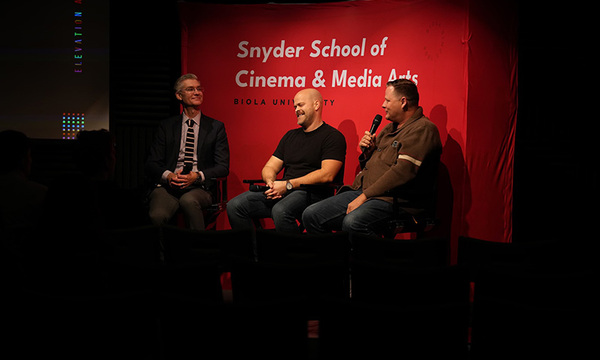Professor Octavio Esqueda’s teaching career started at the age of 12 in Guadalajara, Mexico. His passion for teaching others hasn’t ceased.
“I love teaching and I am grateful to serve at Biola,” said Esqueda. “It is amazing that the Lord of the universe gives us the opportunity to collaborate with him in his work.”
Now, after teaching at nearly every academic level, Esqueda is an associate professor of Christian education at Biola’s Talbot School of Theology and teaches undergraduate Spanish courses. Before landing in California, he moved to Dallas, Texas, from his hometown of Guadalajara to complete his doctorate, spent a semester in Spain and traveled to Cuba 12 times to complete his doctoral dissertation. However, much of Esqueda’s journey to becoming a professor and interest in teaching Christian education is rooted in his early years in Mexico.
Here, he takes some time to share about his passion for the integration of faith and learning, his time spent abroad and how his cross-cultural experience has impacted his teaching style.
Tell us about your career path and journey to becoming a professor.
I first started teaching when I was 12. I had a Sunday school teacher who asked me to teach our Bible lesson once a month. I blame him for becoming a professor! For many years I was in charge of leading the youth Bible study at my church. When I was 19, I started teaching Spanish at a public middle school in my hometown, Guadalajara, Mexico. Three years later I also started teaching Spanish and literature at a private high school. After I graduated from college I taught for a year at ITESO, a prestigious private university in Guadalajara. Therefore, I taught for six years in middle school, three years in high school and one year in college before attending Dallas Theological Seminary where I pursued a M.A. in Christian education with a concentration in college teaching. It was clear that the Lord was leading me to become a professor. I then pursued a Ph.D. in higher education with a minor in Christian higher education. Over the years I have had the privilege of teaching in different countries and at different academic levels. Teaching is both my passion and vocation!
At what point did you become passionate about the integration of faith and learning?
When my parents decided to follow Christ and accept his free gift of salvation, they became in many ways the black sheep of their families because of their strong Roman Catholic background. My dad, in particular, faced a lot of opposition. He worked for almost 30 years as an accountant at the archbishopric in Guadalajara, and because of his new faith, he was forced to leave his job only two years before he could retire. Therefore, he lost his retirement and his family inheritance. Even his own mother started calling him the “animal” or “donkey,” arguing that outside the Roman Church, he was like an animal. I was 15 when my grandmother passed away and my uncle, a very influential priest in the city, organized the last family reunion they ever had. In that meeting he blamed my dad for bringing disgrace to his family when he became a Protestant. My dad tried to explain that he only found new life in Christ and he attempted to tell them what he believed using Scripture. My uncle stopped him and said, “You Protestants are all the same. All of you are ignorant and you are no one to teach me. I went to seminary and spent many years studying theology, philosophy, languages, history and many other subjects. All Protestants try to explain God and the Bible, but what do they know?” I was observing the conversation, and at that moment I decided to invest my life knowing more about God and my faith.
That situation was a turning point in my life and I became passionate about knowing more about God and discovering how he relates to all areas of life. I believe everything is “sacred” because it has the creator God as its origin. In some ways, I don’t like the term “integration” of faith and learning because it assumes that these areas are not integrated and in need of integration. The truth is that they are already integrated because of their common origin in the triune God. We are just “discovering” the connections as we grow in our understanding of the Lord and his creation.
What was it like researching theological education in Cuba for your dissertation and book, Cuban Christian Theological Higher Education?
I had the privilege of traveling to Cuba 12 times and see the marvelous work of God in that country. Cuba has been experiencing a revival for almost 20 years now and it’s amazing to see how the church is growing in spite of many difficulties. My research focused on the seminaries, especially the history of the Eastern Cuba Baptist Theological Seminary. An important aspect of Christian higher education in Cuba is how the seminaries have learned to interact with the Cuban Revolution. I love the Cuban people and I miss learning and being inspired by their zeal and passion for the Lord.
You spent some time in Spain two years ago. What were you doing there?
My family and I spent a semester in the beautiful city of Seville where I had the opportunity to serve in many ways. I was a visiting professor in the School of Education at the University of Seville; I was a guest professor at the Al-Andalus Theological Seminary, where I taught two courses; I participated and led several conferences and preached numerous Sundays in different churches. However, the highlight of that trip was my participation at a conference on the Spanish reformation at the University of Seville.
The Spanish reformers were in many ways more educated and more radical than Luther and they became believers through their study of the Scriptures without foreign influence. Unfortunately, the Spanish inquisition killed almost all of them and wiped out “Protestantism” from Spain. However, very few of them were able to escape, and through the work of Dr. Emilio Monjo, a Spanish scholar and pastor of a local church, many of the works of the Spanish reformers are becoming available for the first time. Two of the Spanish reformers were also monks at a monastery outside of Seville. One of them (Casiodoro de Reina) translated the complete Bible in Spanish for the first time ever. The other one (Cipriano de Valera) revised the translation. To this day, that Bible translation (Reina-Valera) is the most widely used for believers in the Spanish-speaking world. I focused my research primarily on Constantino Ponce de la Fuente, a Bible teacher who became the personal chaplain of King Charles V and the main priest at the Cathedral in Seville, and Antonio del Corro, another monk who was a true educator and became a theologian in residence at Oxford University. The story of the Spanish reformation is fascinating!
How has that time impacted you as a professor?
I am impressed by the zeal for the Lord that Spanish reformers had. They were able to distinguish the essential and core beliefs of Christianity and to defend them even with their lives. I think that I, as both a follower of Christ and a professor, need to live and teach according to the essential doctrines of my faith. It is very easy to become distracted with secondary or minor details and to miss what is really important. On the other hand, I want to follow the example of Antonio del Corro, a Spanish reformer who was an outstanding Christian educator, who allowed any kind of students and questions in his classes and deeply respected the “freedom of conscience” of his students. He refused to take sides on secondary doctrinal disputes and, although he was willing to die for his faith in Christ, he also gave all students the opportunity to think and believe by themselves.
You’ve talked about busyness being a virtue in today's culture. Can you share more about that?
I have realized that busyness is a celebrated virtue in our culture. For example, I remember during my first semester teaching at another seminary a senior professor asked me how I was doing. I replied that I was too busy and with a smile on his face he said “good.” For him and for many more, being busy is something good. However, even though I agree that we need to work hard and do our best for the Lord, the busyness in which we constantly live is a vice, not a virtue.
A couple of years ago, I participated at a seminar about the seven capital sins or vices, and at that time I developed a better understanding about the devastating consequences of our constant busyness. Sloth is one of the seven capital sins, and it is usually understood as laziness. However, laziness is only a minor manifestation of sloth. This vice goes deeper and represents our lack of willingness to freely receive God’s grace. Sloth is our apathy for our calling as servants of God and for the needs of others. Consequently, we can even be too busy serving God that we miss God and God’s people. When we are too busy, we become self-centered, which is a key characteristic of sin, and miss God’s work in our lives and in our neighbor. I find it surprising that evangelicals do not have any problem accepting that salvation is by God’s grace and yet many believe, perhaps unconsciously, that the Christian life is by works and not also by grace. Everything we do is only by the grace of God (Eph. 2:10)!
We need to constantly remember that “being” comes before “doing.” Christ came to give us abundant life (John 10:10) and we need to receive his grace and enjoy life. We need to rest, sleep well and spend time with our loved ones and our neighbors without feeling guilty that there are other tasks we need to accomplish. We need to live for the Lord and to love our neighbor as we love ourselves.
For more information, contact Jenna Bartlo, Media Relations Specialist, at 562.777.4061 or jenna.l.bartlo@biola.edu.
 Biola University
Biola University
_(1).jpg)
